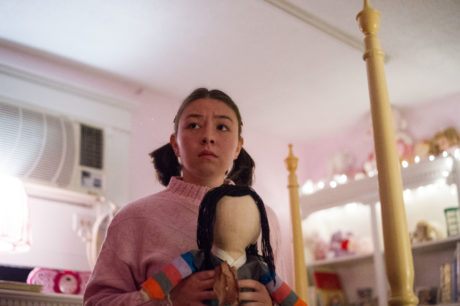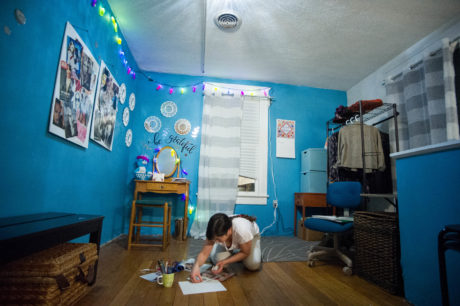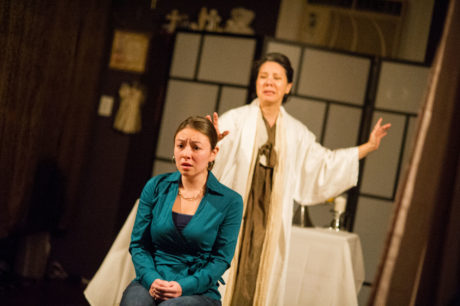Having heralded five* Welders productions, I approached Deb Sivigny’s Hello, My Name Is… with both eagerness and wariness. Knowing that Sivigny had chosen as her subject a fact of her own biography—international adoption—I went aware that sometimes the very personal works onstage and sometimes it doesn’t, and saying so when it doesn’t can be awkward if not insulting. Knowing also that Sivigny does not have a rich résumé as a writer as she does for her stunning work as a scenic and costume designer, I went aware that sometimes dramaturgical inexperience works and sometimes it doesn’t, and saying so when it doesn’t can be harsh if not uncivil. So I went with more than usual hope that Sivigny’s work would be something I’d like.
And I didn’t just like Hello, My Name Is…. It left me in awe.
Read David Siegel’s review of Hello, My Name Is…
Three things stood out for me about Sivigny’s singular achievement with Hello, My Name Is…. First and foremost was its dramaturgical originality. Though billed as Lead Producing Playwright (as all members of The Welders are when their turn comes), Sivigny has created something far more than a play. Hello, My Name Is…, directed by Randy Baker, is staged in a two-story house in Takoma, with an audience of no more than 15 guided from room to room and sometimes outdoors as a cast of eight actors perform in various roles. But this is no ordinary site-specific theater; nor is it stunt-writing (where the gimmick is pretty much all there is to get). This was instead a wholly original form of realizing thematic depth and human dimension in theatrical storytelling.

For some of the characters, the audience is not “there.” We are in their living spaces and they are in their worlds. They are inches from us but not performing for us. Three of them were born in South Korea (as was Sivigny). As to the topic of international adoption they represent, schematically speaking, the Good, the Bad, and the Conflicted. Dana (Janine Baumgardner) was adopted into a wealthy family and has no qualms about that; happily, they’re her home now. Bryan (Jon Jon Johnson) was in foster care for years then taken in by a family who failed to file naturalization papers for him; so when he is busted for pot he is deported to Korea, still with no home, and he lives in fury about all that. June (Linda Bard) was adopted into a loving, ingratiatingly Christian home but knows that to know who she is, she must know more about her birth mother, and what she finds out does not console her.

The way these three characters’ stories overlap, intersect, and converge is the dramaturgical genius of the piece. We come upon them in various scenes—such as in June’s girly-pink bedroom, where she wordlessly embraces a faceless doll; in Bryan’s foster dorm, where in great distress he writes and incessantly rewrites a letter to his imagined birth mother; in Dana’s faddish teen bedroom, where she blithely dances to pop music on a CD player. The characters grow up between scenes. We meet Dana again in the backyard, staged as a wedding reception, where she is the toast of her guests (us). We meet them all together in a restaurant in Seoul, where they have come to discover themselves in their pasts. As we encounter these characters (as if we are privy to their real lives) and as the narrative threads that connect them interweave in our minds, we come to know and care about them in a different way from how we relate to characters “on stage.” They are so close to us and familiar to us it is as if they are in our lives like family.

Other characters relate to us directly. Aunt Rosey (Julie Garner) welcomes us into her Minnesota living room for what will be a “Welcome Home” surprise party when the adoptee June arrives. We all wear name tags; Rosey addresses us personally, offering us snacks, drinks, and hotdish; we chat among ourselves. “I have no idea what hotdish is,” another audience member says to me. At which point memories of Minnesota potlucks come flooding back and I say, “I grew up on it.” Without our knowing it, we become an ensemble in Sivigny’s dramaturgy: a temporary, transient family. And that is the second feature of Sivigny’s achievement that stands out for me. The audience’s identity is transformed from the very beginning. Though we bear our own names, we together adopt a different identity. Thus when we are ushered from room to room, we are not only witnesses; we are also the displaced. We are taken from one unfamiliar location to another unfamiliar location, where we need to find our place not only literally (where to sit or stand) but metaphorically. In thus mirroring the experience of the three characters whose life stories we are following, we become like active listeners in a conversation, always affirming we hear you.
Among the other characters who relate to us directly are Birth Mother (Jennifer Knight) and Ultimate Mother (Wyckham Avery), who do so in very different ways. Birth Mother wafts in and out of scenes, dancerly and silently, and looks deeply into our eyes as if seeking someone, perhaps her lost child, evoking for us the mother whom June, Dana, and Bryan seek and can never know. The way this character has been conceived to inhabit a physical and psychic dimension midway between the characters’ lives and our own is a remarkable stroke of theater-making.

Ultimate Mother, on the other hand, has plenty to say. She addresses us in the office of her adoption agency in Korea where we are gathered to hear her hold forth about the wonderful things she has done for unwanted Korean children—and at her unsubtle urging, we offer her gifts of appreciation (props preset underneath our chairs). While Ultimate Mother’s speeches are more conventionally shaped, the gesture we are coaxed to make—giving her gifts—is decidedly not. Symbolically our action brings us into complicity with this international adoption operation, and we are set up to see it prima facie as a social virtue.
But the issue turns out to be far more complex than that. In the subsequent scene in Seoul—where June, Dana, and Bryan meet up in a restaurant—Sivigny lays out the characters’ three dramatically divergent experiences of, and views on, international adoption: the Good, the Bad, and the Complicated. (Bryan is particularly eloquent in his angry denunciation of the Korean government policies that left so many children vulnerable to begin with.) Here I found a third extraordinary aspect of Sivigny’s achievement: We hear three different characters speak their distinct subjective realities, which are not compatible objectively; yet as contradictory as they are, the playwright has given them each equal valence, has fully upheld and advocated each of their points of view, and made them each true to a believable life. This artfully impartial handling of dramatic and thematic conflict is what makes great plays last, and this authorial depth of empathy across difference is the stuff of which great theater is made.
That Sivigny literally immerses us in Hello, My Name Is… in the experience of her extraordinary dramaturgy offers yet more evidence that The Welders has become one of DC’s premier incubators of innovative theatrical storytelling.
Running Time: 90 minutes with no intermission.
Hello, My Name Is… is playing through November 12, 2017, at RhizomeDC – 6950 Maple Street, NW, in Washington, DC, attendance is limited, and shows are selling out. For tickets, call 1-800-838-3006, or purchase them online.
Notes from The Welders:
- The location is indoor/outdoor and weather may vary. Please dress for warmth and comfort.
- The location is not wheelchair accessible. If you have mobility or other accessibility concerns, please contact the Welders at [email protected] before purchasing your ticket.
- Seating is not guaranteed. Some sections are standing room only.
- Parties may be split up.
- Food will be a part of the experience. If you have allergies or other concerns, please let us know when you check in.





